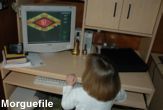Multimedia Babies: What's a Parent to Do?

WASHINGTON (AP)—They're bombarded with electronics starting in infancy, from the new "Sesame Street'' for 6-month-olds to game-playing laptops for toddlers. But when does being a multimedia youngster help—and when does it hurt—children's malleable brains?
The claims vary widely, from proponents who say TV and baby software can help kids learn to criticisms that they steal crucial time once spent playing and reading, or even causes attention disorders.
The reality: There is little clear data on how TV affects child development at any age, much less before age 2—and even less research on computers for tots, video games and other now-pervasive electronic media.
So lament child experts called together by the National Institutes of Health on Monday to debate what research is most needed, and what to tell parents in the meantime.
"Content does matter. Television designed to enhance cognitive development does so,'' said University of Massachusetts psychologist Daniel Anderson, referring to the well-studied preschool shows "Sesame Street'' and "Blue's Clues.''
But, "other kinds of TV or too much TV may interfere with cognitive development,'' he warned. "Most immediately, we need to know the effects of very early media exposure.''
The American Academy of Pediatrics says children under 2 shouldn't watch TV at all, and that older kids should watch no more than two hours a day.
Sign up for the Live Science daily newsletter now
Get the world’s most fascinating discoveries delivered straight to your inbox.
Yet the Kaiser Family Foundation found in 2003 that two-thirds of children under 2 were watching TV an hour a day plus spending almost another hour on computer or video games.
Almost half of 4- to 6-year-olds had TVs in their bedrooms. And after age 8, "screen time''—TV plus computers and other electronic media—soared to 6.5 hours a day, on average.
For babies in particular, there's a skyrocketing market: The "Baby Einstein'' video craze aside, there's a new satellite TV channel just for babies, a computer game that requires infants to bang the keyboard to change the screen, and a multitude of talking books and DVD-based "learning systems.''
Why? Parents in general don't view electronic media as bad. In fact, they often ask if their babies will miss out if they don't sit them in front of the computer early, noted David Bickham of the Children's Hospital of Boston media and child health center.
"There's a reason why parents put the 2-year-old in front of the television,'' agreed Amy Jordan of the University of Pennsylvania. Maybe they live in a neighborhood where it's not safe to play outside, or they just need time to cook or take a shower.
When it comes to older kids, many parents consider watching "American Idol'' with their preteen quality family time—and few parents even know how to use those TV ratings mandated to help determine age-appropriate content, Jordan says. When "Y7 FV'' flashed in the corner of the screen, for instance, many parents told her they thought it meant "family values''—when it really means not for under age 7, contains fantasy violence.
What does the existing research say?
There's little disagreement that violent programs are bad for kids, leading to fear and aggressive behavior, and that TV in a kid's bedroom leads to sleep disorders.
Other issues are confusing. A few studies suggest that baby or preschool TV might lead to attention disorders, because the rapid pace of programming alters brain development—while other studies directly contradict that.
When it comes to learning, the child's age and the program's content seem key.
Take babies. They are watching: The Sesame Workshop launched its new Sesame Beginnings videos for infants after learning that viewing of its classic "Sesame Street'' now peaks at age 2—far earlier than the 3- to 5-year-olds it targets to teach reading and math concepts.
"What a 1-year-old is getting from 'Sesame Street' content leaves us baffled,'' said workshop vice president Rosemarie Truglio. She describes the new baby videos as showing parents different ways to interact with their infants rather than aiming to "teach'' the tiniest viewer.
"Frankly I think the don't-watch-TV-under-age-2 pediatrics recommendation, in this day and age, is not helpful,'' said Ellen Wartella of the University of California, Riverside, who instead wants more constructive advice for parents.
Among the suggestions offered Monday:
No adult TV when youngsters are in the room. Rachel Barr of Georgetown University says parents think babies aren't paying attention, but research showed that when "Jeopardy!'' was on in the background, tots' play was distracted.
If you need to pop in a video for the under-2 set while you cook dinner, talk them through it. "Look, that's a ball, just like your ball.'' "Oh, see the kitty—what does a kitty say?'' It helps their comprehension, Barr's research shows.










